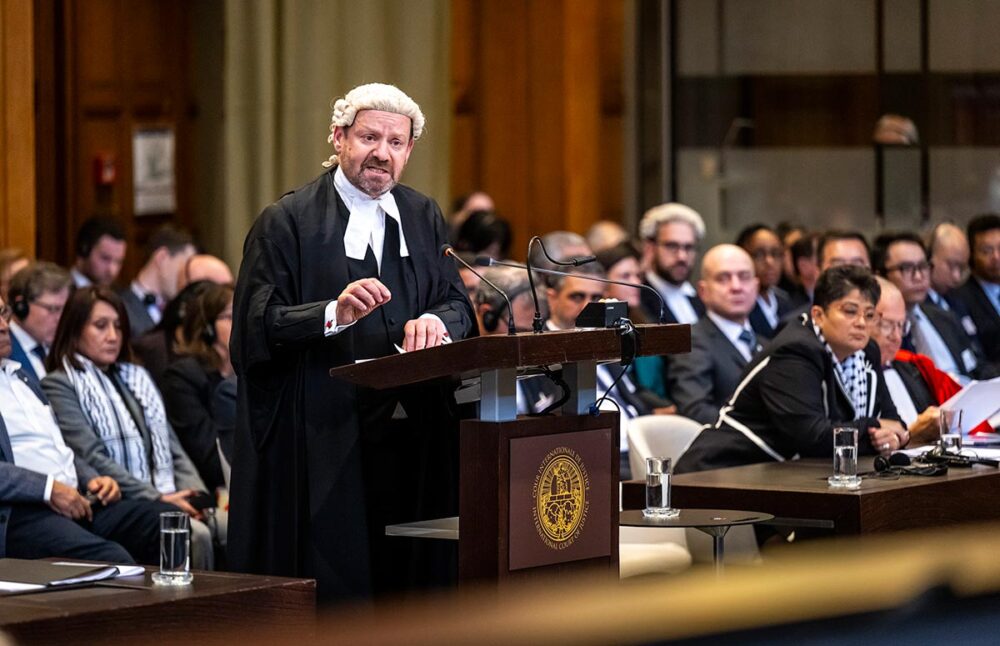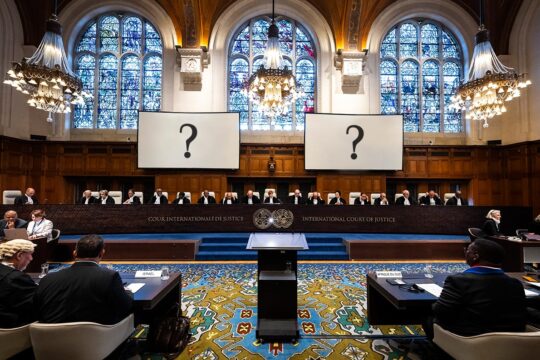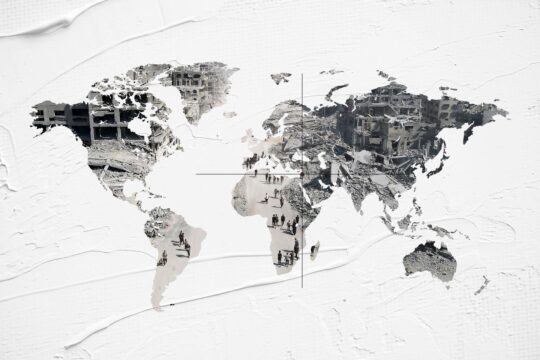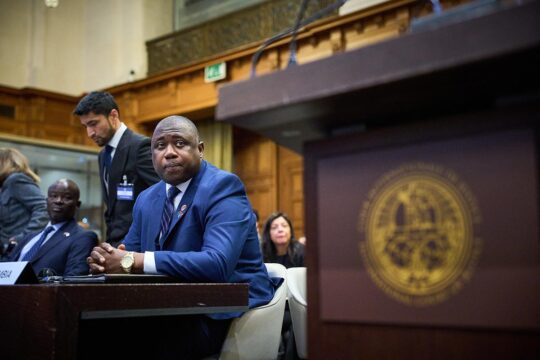“No one in this Great Hall of Justice is starry-eyed about international law, but it is what we have,” proclaimed British barrister and King’s Counsel Philippe Sands, as he appeared for Palestine before the International Court of Justice (ICJ) on February 19. He placed his arguments squarely in the context of the “right to self-determination” enjoyed by all peoples under the United Nations Charter. That right “has real and practical consequences,” he continued, including the right to control land and resources and be free from demographic manipulation.
Israel is not attending the hearings. While Palestine’s representatives spoke over three hours and submitted a 390-page written brief, Israel filed a five-page document challenging the legitimacy of the proceedings. It argues that the framing of the questions before the court is “prejudicial” and disregards the “thousands of dead and wounded Israelis who have fallen victim to murderous Palestinian acts of hatred and terrorism - acts that continue to endanger Israel's civilians and national security on a daily basis.”
The challenge for Palestine and the states that agree with its analysis is to convince judges that they should see what is happening in Palestine now in the grand sweep of history, and boldly apply several international law instruments including the United Nations Charter, and conventions on racial discrimination and against apartheid, to analyse the situation. The judges are being encouraged not to be overly deferential to any state’s arguments about endangering putative peace negotiations or Israel’s security.
Countering Israel’s argument over security
The context of the mounting casualties in the war in Gaza provided a steady drumbeat during Palestine’s presentations, emphasising the urgency of the situation and providing additional evidence of the Israeli leadership’s negative attitudes to any prospective Palestinian state. But the mass of documents, maps and the quotes fielded by Palestine skirted over many potential Israeli counter-arguments.
Bewigged Philippe Sands has appeared before the court in many cases. He made a comparison to one of them - the court’s advisory opinion over the Chagos Islands in which the court ruled on self-determination against the counter view that security issues were at stake. “In Chagos, the Court swatted away British and American arguments that alleged security concerns somehow trump the right of self-determination and its exercise. We trust that the Court will dismiss the argument that the Palestinian people’s right of self-determination is somehow conditional upon a subjective determination by Israel as to matters of its security.”
Sands says that an opinion of this court makes a peaceful resolution to the Israeli-Palestinian conflict more likely, not less likely.
“Palestinian statehood is not dependent on the approval of Israel. The Occupying Power does not have, and cannot have, a right of veto over the right of self-determination of the Palestinian people,” he concluded. "The right of self-determination requires that UN Member States bring Israel’s occupation to an immediate end. No aid. No assistance. No complicity. No contribution to forcible actions. No money, no arms, no trade, no nothing. All UN Members are obliged by law to end Israel’s presence on the territory of Palestine. Period."
The legality of occupation
Palestine’s team was led by the foreign minister and also had legal luminaries such as French scholar in red robes Alain Pellet and veteran US attorney Paul Reichler. Reichler previously represented Nicaragua in one of the court’s landmark cases which found that the US violated international law in using force against Nicaragua. He made a distinction in his arguments between the law that governs occupation - international humanitarian law - and the actual legality of occupation, saying that the benchmark for assessment here was the United Nations Charter.
He stated that 35 of the submissions from states dealt with the legality of occupation and only two supported it: US and Fiji. (Not all the submissions have yet been published.) Reichler singled out the United States for much of his critique saying that whatever violations of international law Israel commits, “the US always seeks to shield it from accountability.” He quoted from Barack Obama 2020 memoirs on how “US diplomats found themselves in the awkward position of having to defend Israel for actions we ourselves opposed.”
"International law requires that this entire illegal enterprise be terminated," Reichler said.
Racial discrimination and apartheid
Namira Negm, former Egyptian ambassador and former counsel to the African Union, sporting a black and white keffiyeh tucked into her jacket, spoke on the discrimination faced by Palestinians.
"Starting from the Nakba of 1948 until now, Israel has adopted discriminatory legislation and measures by which it has established a deeply entrenched system of racial discrimination against Palestinians, subjugating them to Israeli domination and denying their fundamental rights,” she said. Discrimination is “as integral to Israel’s prolonged occupation as is the annexation and colonization of the Palestinian territory.” They “feed off each other," she pleaded.
She compared Israel’s policies to the “institutionalized racial discrimination and segregation that existed in South Africa” and called on the court to play again the role it had in 1971, concerning apartheid, “to bring about an end to this glaring injustice” and “ this illegal situation” and instead “bestow on the Palestinian people the fundamental rights to which they are entitled by international law, yet which they have been so unjustly denied." She repeated what UN experts had described as a “vision of 21st-century apartheid” where Israelis and Palestinians travel on segregated roads, “a phenomenon that even apartheid South Africa never knew.”
The discrimination is “elaborated through laws, military courts, violence, discriminatory zoning and planning, and collective punishment,” she added.
For Israel, an abuse of judicial process
In the Israeli written submission they say that all the documented evidence from UN special rapporteurs and commissions of inquiry provide only “a clear distortion of the history and present reality of the Israeli-Palestinian conflict. Contrary to any conception of due process, the Court is asked simply to presume Israeli violations of international law - to accept, as given, plainly biased and flawed assertions directed against Israel alone.” It argues that “the tendentious questions placed before the Court not only distort the factual reality: they fundamentally misrepresent the legal reality as well…The Israeli-Palestinian conflict is not a cartoon narrative of villain and victim in which there are no Israeli rights and no Palestinian obligations.” The very request for an advisory opinion from the court is, Israel says, “contrary to the established legal framework governing the Israeli-Palestinian conflict, and an abuse of international law and the judicial process.”
Israel outlines the threat it has faced from the Gaza Strip following its voluntary withdrawal in 2005 with “tens of thousands of rockets” launched against the civilian population and “calls for the annihilation of the State of Israel.” They point out that “peacemaking initiatives advanced over many years... scuttled by repeated rejections by the Palestinian leadership itself.”
Israel also says the questions as framed fail to appreciate “the very existence of the Israeli-Palestinian agreements, according to which the two sides have agreed to resolve through direct negotiations precisely the subject-matter placed before the Court, including such issues as the permanent status of the territory, security arrangements, settlements, and borders.”
Over the week, more than fifty states and international organisations will present their arguments to the court, supported by their written submissions. Then it will be up to the judges to rule of one of the most significant cases the court has had before it.








